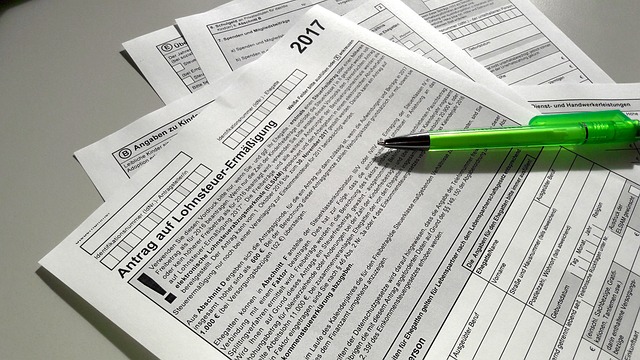UK Corporate Tax Documents require specialized translation services that offer both linguistic expertise and a deep understanding of tax laws and accounting principles. These services ensure accuracy, compliance with various jurisdictions' regulations, and protection of sensitive financial information through robust security measures such as encryption and secure file transfer protocols. Expert translators well-versed in corporate tax terminology convey the precise details across different languages, while advanced tools and methodologies are employed to guarantee that translated documents accurately mirror the original text's meaning and context. This allows businesses to present their financial information with clarity and transparency to international stakeholders and regulatory entities, thus facilitating effective communication, mitigating translation risks, and safeguarding fiscal integrity for operational success in the UK.
Navigating the complexities of international business requires meticulous attention to detail, particularly when it comes to translating UK Corporate Tax Documents. This article delves into the nuanced process of ensuring these documents are accurately conveyed in multiple languages, highlighting the importance of precision and expertise. We will explore the intricacies of UK Corporate Tax Documentation Requirements, address the challenges posed by linguistic and cultural differences, and underscore the pivotal role of professional translation services in maintaining tax compliance across borders. Additionally, we will examine legal and regulatory considerations, identify key strategies for selecting a reliable translation provider, and discuss best practices for data security during the translation process. From the intricacies of translating complex financial terminology to leveraging technology for precise translations, this article provides a comprehensive guide to achieving clarity and accuracy in multilingual tax reports. Join us as we explore the critical interplay between accounting, law, and language to ensure that UK Corporate Tax Documents are translated with the utmost professionalism and care.
- Understanding the Importance of Accurate Translations for UK Corporate Tax Documents
- Overview of UK Corporate Tax Documentation Requirements
- Key Challenges in Translating Business Tax Documents
- The Role of Professional Translation Services in Tax Compliance
- Legal and Regulatory Considerations for Tax Document Translation
- Identifying a Reliable UK Corporate Tax Document Translation Provider
- The Process of Translating Complex Financial Terminology Accurately
- Ensuring Consistency and Clarity in Multilingual Tax Reports
- Case Studies: Successful Translations of UK Corporate Tax Documents
- Best Practices for Maintaining Data Security During Translation
Understanding the Importance of Accurate Translations for UK Corporate Tax Documents

In the realm of international business, precise communication is pivotal, particularly when it comes to tax compliance and reporting. UK Corporate Tax Documents require meticulous translation services to ensure that financial information is accurately conveyed across different languages. The consequences of mistranslation in such documents can be costly, leading to legal complications, fines, or even affecting the integrity of cross-border negotiations. Therefore, businesses engaging with entities outside the UK must utilize professional UK Corporate Tax Documents translation services that specialize in financial terminology and tax regulations. These experts not only facilitate a clear understanding of the fiscal obligations but also safeguard the company’s interests by providing documents that are legally and contextually accurate. This is crucial for maintaining transparency, fulfilling legal requirements, and upholding a company’s reputation in a global marketplace.
When navigating the complexities of tax laws and ensuring compliance, the fidelity of translations cannot be overstated. UK Corporate Tax Documents often contain intricate details that are critical for accurate tax reporting and compliance. Translation services adept in this niche offer unparalleled precision, leveraging industry-specific knowledge to bridge linguistic barriers. This ensures that all numerical data, legal terms, and contextually significant information is rendered without ambiguity or error. By choosing experienced UK Corporate Tax Documents translation services, businesses can proceed with confidence, secure in the knowledge that their financial disclosures are clear, accurate, and ready for submission to regulatory authorities worldwide.
Overview of UK Corporate Tax Documentation Requirements

UK businesses engaged in cross-border transactions or with multinational operations must navigate a complex landscape of corporate tax documentation. The UK Corporate Tax Documents translation services play a pivotal role in this process, ensuring that financial records and statements comply with both UK and international standards. The UK’s Corporation Tax Act 2009 sets out the requirements for corporations to prepare and submit accurate and complete tax documentation. This includes Company Tax Returns, CT600 forms, and supporting documentation such as balance sheets, profit and loss accounts, and capital and revenue accounts. These documents must be prepared in a manner that accurately reflects the company’s financial position and is consistent with UK Generally Accepted Accounting Practice (UK GAAP) or International Financial Reporting Standards (IFRS).
Given the intricacies of tax law and the potential for misinterpretation, translating these documents into other languages requires not only linguistic proficiency but also a deep understanding of accounting principles and tax regulations. UK Corporate Tax Documents translation services offer expertise in both areas, providing businesses with translations that are technically accurate and legally sound. This ensures that foreign authorities can accurately assess a company’s tax liabilities, facilitating compliance and potentially avoiding costly penalties or disputes. With the increasing importance of global markets, the need for reliable UK Corporate Tax Documents translation services is paramount for businesses looking to operate seamlessly across borders.
Key Challenges in Translating Business Tax Documents

The process of translating business tax documents, particularly UK Corporate Tax Documents, presents a unique set of challenges that require specialized knowledge and precision. Language nuances, legal terminology, and cultural contexts play pivotal roles in ensuring the translated content is both accurate and legally compliant. Translators must possess a deep understanding of both the source and target languages, as well as the intricacies of tax legislation. The stakes are high; any oversight or misinterpretation could lead to significant financial consequences for businesses. Moreover, the translation must adhere to the legal requirements of the destination country, which often involves not only a linguistic conversion but also an adaptation to meet the local legal standards and practices.
UK Corporate Tax Documents translation services must navigate through complex tax regimes, which are subject to frequent updates and amendments. The task goes beyond mere word-for-word translation; it requires a translator to interpret and transpose the meanings of financial statements, accounting principles, and legal obligations in a way that is both understandable and legitimate within the context of the target jurisdiction. This demands not only linguistic expertise but also a grasp of international tax laws and bilateral agreements, if applicable. Additionally, confidentiality and data protection are paramount, as sensitive financial information must be safeguarded throughout the translation process to protect the company’s interests.
The Role of Professional Translation Services in Tax Compliance

Professional translation services play a pivotal role in ensuring the accurate transmission of financial information, particularly within the realm of UK Corporate Tax Documents. In an increasingly globalized business environment, where multinational corporations often operate across various jurisdictions, the need for precise translations is paramount. The intricacies of tax laws and regulations can be daunting, and nuances in language can lead to misinterpretation or non-compliance with tax obligations. By leveraging specialist translation services, businesses can navigate these complexities confidently. These services are staffed by experts who not only possess a deep understanding of linguistic nuances but also have specialized knowledge in financial and tax terminology specific to the UK corporate sector. This confluence of language mastery and subject matter expertise is crucial for maintaining compliance with tax regulations, thereby reducing the risk of legal penalties and ensuring that financial statements are transparent and understandable to all stakeholders involved.
Incorporating UK Corporate Tax Documents translation services as part of a company’s compliance strategy can significantly enhance operational efficiency and minimize errors in reporting. With the stakes being high, especially with the potential for substantial financial implications, it is imperative that every detail is conveyed accurately between different language speakers and entities. These translation services offer scalable solutions tailored to the needs of businesses, whether they are large conglomerates or smaller enterprises looking to expand their operations internationally. By facilitating seamless communication across borders, these services empower companies to meet their tax compliance obligations without compromising on accuracy or timeliness.
Legal and Regulatory Considerations for Tax Document Translation

When venturing into the realm of translating business tax documents, particularly UK Corporate Tax Documents, it is imperative to navigate the intricate legal and regulatory frameworks that govern such transactions. Translators must possess an in-depth understanding of both UK tax legislation and the specific requirements of the target language’s legal system. This ensures compliance with international tax laws and standards, which are subject to frequent updates and revisions. The accuracy of translations directly impacts the legitimacy and enforceability of financial reports, potentially affecting a company’s reputation, legal standing, and fiscal outcomes.
Translation services specializing in UK Corporate Tax Documents must employ qualified professionals who are not only linguistically proficient but also well-versed in taxation principles. These experts work within strict confidentiality protocols to safeguard sensitive financial information. By leveraging specialized software and adhering to industry best practices, these services provide precise translations that withstand scrutiny by regulatory bodies, legal authorities, and auditors. The stakes are high, as errors can lead to penalties, audits, or even legal disputes, making the quality of translation a critical component in global business operations.
Identifying a Reliable UK Corporate Tax Document Translation Provider

When the need arises for precise translations of UK Corporate Tax Documents, selecting a reliable translation service is paramount. Businesses operating in multinational contexts must navigate complex tax regulations and ensure compliance with local laws. A competent UK Corporate Tax Documents translation provider will possess specialized knowledge in both accounting and legal jargon specific to the UK corporate tax environment. They should be adept at conveying the nuances of these documents accurately, maintaining the integrity of the financial information and legal stipulations contained within. Look for services that offer a track record of experience in this niche field, as well as those that employ professional translators with certification in translation from relevant authorities. These translators must be proficient not only in the source and target languages but also in the technical aspects of financial and tax terminology to provide UK Corporate Tax Documents translation services that are both accurate and legally sound. Additionally, they should ensure confidentiality, given the sensitive nature of corporate tax information, and provide swift turnaround times to meet regulatory deadlines. By choosing a provider with these qualities, businesses can facilitate smooth communication with international stakeholders and regulatory bodies, thereby minimizing risk and ensuring compliance in cross-border transactions.
The Process of Translating Complex Financial Terminology Accurately

When it comes to translating UK Corporate Tax Documents, precision and accuracy are paramount. The process begins with a meticulous selection of expert linguists who possess not only a proficient command of both the source and target languages but also a deep understanding of financial terminology and the nuances inherent in corporate tax documents. These translators undergo rigorous training to grasp the complexities of fiscal regulations and accounting standards that vary across different jurisdictions. They are adept at navigating through intricate phrases and technical jargon, ensuring that every term is translated with fidelity to its original meaning while remaining faithful to the context within which it is used.
The translation workflow is structured to maintain consistency and accuracy throughout the document. This involves employing specialized translation memory software that stores previously translated content, thereby facilitating a coherent and accurate representation of the source material. Additionally, a thorough review process is implemented, where documents are scrutinized by subject matter experts in both linguistic and financial realms. This collaborative approach ensures that the translations of UK Corporate Tax Documents meet the highest standards of accuracy and compliance with legal requirements, providing businesses with trustworthy translations that can stand up to scrutiny from tax authorities and regulatory bodies.
Ensuring Consistency and Clarity in Multilingual Tax Reports

When businesses operate across international borders, maintaining consistency and clarity in tax documentation is paramount. This is particularly true when translating UK Corporate Tax Documents for compliance in different jurisdictions. The translation of such documents requires not just linguistic proficiency but also an intimate understanding of tax laws and accounting standards. Translation services specializing in this niche must employ expert translators who are adept at navigating the complexities of corporate tax language, ensuring that every term and figure is accurately conveyed across languages. These professionals use advanced tools and methodologies to deliver translations that reflect the original text’s intent and context without alteration or ambiguity. By doing so, they enable businesses to present their financial information transparently to stakeholders and regulatory bodies in multiple countries, thereby facilitating seamless cross-border operations and compliance with local regulations. Opting for UK Corporate Tax Documents translation services that offer precision and adherence to industry standards is a strategic advantage for companies looking to expand or maintain their global presence.
Case Studies: Successful Translations of UK Corporate Tax Documents

UK corporate tax documents require meticulous attention to detail and a deep understanding of both the source and target languages, as well as the complex tax legislation specific to the UK. To illustrate the importance of precise translation in this context, consider the case of a multinational corporation expanding its operations into the UK market. The accuracy of their corporate tax documents, including annual accounts and tax computations, directly impacts their compliance with HM Revenue & Customs (HMRC) standards and their overall fiscal strategy.
One such instance involved a European company seeking to navigate the intricacies of the UK’s Corporation Tax Act 2009. The documents were rife with technical jargon and complex financial structures that could have led to misinterpretation and costly compliance errors if not handled by experts in both tax law and translation. Utilizing specialized UK corporate tax documents translation services, the company successfully translated these documents, ensuring that their financial statements accurately reflected their UK operations and adhered to the required legal standards. This not only facilitated seamless communication with UK authorities but also provided clarity for stakeholders, thereby avoiding potential pitfalls associated with inaccurate translations.
Best Practices for Maintaining Data Security During Translation

When translating UK Corporate Tax Documents, maintaining data security is paramount to safeguard sensitive financial information and protect against potential breaches. To ensure the highest level of security during the translation process, it is crucial to employ robust encryption methods for all data transmissions. This includes using secure file transfer protocols that are aligned with industry standards such as SSL/TLS. Additionally, all parties involved in the translation process—translators, project managers, and clients—should be made aware of best practices for handling confidential documents, including restricting access to the information on a need-to-know basis and implementing stringent password policies.
Furthermore, UK Corporate Tax Document translation services must adhere to compliance with data protection regulations, such as the General Data Protection Regulation (GDPR) and the UK’s Data Protection Act 2018. This means that personal data should be processed fairly and lawfully, and translation service providers must take measures to ensure data accuracy, integrity, and confidentiality throughout the translation lifecycle. Employing professional translators with expertise in both taxation and legal terminology further mitigates the risk of misinterpretation or mishandling of data. Utilizing secure cloud platforms that are ISO 27001 certified can also enhance data security, providing an additional layer of protection for sensitive tax documents during translation. By combining technical safeguards with best practice policies, UK Corporate Tax Document translation services can confidently maintain data integrity and security throughout the translation process.
UK corporate tax documents require meticulous attention to detail and precision in translation to uphold legal integrity and regulatory compliance. This article has delineated the critical aspects of this process, from the intricate requirements of UK corporate tax documentation to the challenges posed by complex financial terminology. It is clear that leveraging professional UK corporate tax document translation services is not just a best practice but an indispensable step in ensuring translations are accurate and adhere to legal standards. By carefully selecting a trustworthy provider with expertise in this specialized field, businesses can navigate the multilingual landscape confidently, maintaining clarity, consistency, and data security throughout the translation process. The case studies presented underscore the importance of this endeavor, demonstrating how precise translations can lead to successful tax compliance across borders. In conclusion, for organizations dealing with UK corporate tax documents in multiple languages, prioritizing professional translation services is a strategic investment that safeguards both legal standing and financial integrity.
